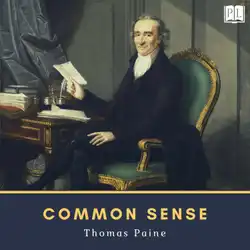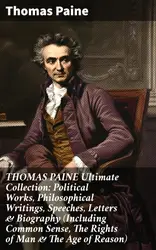In Thomas Paine's revolutionary work, 'The Age of Reason,' the author challenges the traditional beliefs of Christianity and advocates for a rational, deistic understanding of religion. Paine's direct and straightforward writing style reflects the Enlightenment ideals of reason and skepticism towards organized religion. Published in 1794, this book was a controversial and groundbreaking piece of literature that sparked debates about the role of religion in society. Paine makes a compelling argument for a more individualistic and logical approach to spirituality, urging readers to question religious doctrines and think for themselves. 'The Age of Reason' is a thought-provoking and influential piece that continues to be studied and debated by scholars and theologians to this day. Thomas Paine's fearless pursuit of truth and intellectual honesty shines through in this seminal work, solidifying his reputation as a key figure in the Age of Enlightenment. His background as a political activist and pamphleteer undoubtedly influenced his decision to write a provocative and revolutionary book that challenges traditional beliefs and promotes free thinking. I highly recommend 'The Age of Reason' to readers interested in exploring the intersection of religion, philosophy, and reason.

The Essential Works of Christianity : 50+ Works on Theology, Philosophy and Spirituality; Including Christian Fiction Classics
Saint Augustine, Pope Gregory I, Martin Luther, Friedrich Nietzsche, Thomas Paine, Leo Tolstoy, Athanasius of Alexandria, Gregory of Nyssa, John of Damascus, Thomas à Kempis, St. Teresa of Ávila, Brother Lawrence, David Hume, Ludwig Feuerbach, Charles Spurgeon, Andrew Murray, G. K. Chesterton, Arthur Pink, Dante Alighieri, John Milton, John Bunyan, Voltaire, Lew Wallace, Henryk Sienkiewicz, Charles M. Sheldon, Henry Van Dyke, Grace Livingston Hill, Fyodor Dostoevsky, Johann Wolfgang von Goethe, Ralph Waldo Emerson, H. Emilie Cady, James Allen, Prentice Mulford, Florence Scovel Shinn
book
15+ Political Science. Classics Collection : The Art of War, Tao Te Ching, The Republic, Meditations, The Prince, Utopia, Utilitarianism, Anarchism and others
Sun Tzu, Lao Tzu, Plato, Marcus Aurelius, Niccolo Machiavelli, Thomas More, Tommaso Campanella, Francis Bacon, Thomas Paine, John Stuart Mill, Karl Marx, Friedrich Engels, Vladimir Lenin, Rosa Luxemburg, Peter Kropotkin, Emma Goldman, Leon Trotsky
audiobook
Common Sense
Thomas Paine
audiobookbook
The Greatest Books of Spiritual Wisdom : The Age of Reason, As a Man Thinketh, The Holy Spirit…
Saint Augustine, Pope Gregory I, Martin Luther, Friedrich Nietzsche, Thomas Paine, Leo Tolstoy, Athanasius of Alexandria, Gregory of Nyssa, Basil the Great, John of Damascus, Saint Thomas Aquinas, Thomas à Kempis, St. Teresa of Ávila, Brother Lawrence, David Hume, Ludwig Feuerbach, Charles Spurgeon, Andrew Murray, G. K. Chesterton, Arthur Pink, John Stuart Mill, Ralph Waldo Emerson, H. Emilie Cady, James Allen, Prentice Mulford, Florence Scovel Shinn, Wallace D. Wattles
book
10 Great Books of Religion and Philosophy : The Consolation of Philosophy, The Varieties of Religious Experience, The Age of Reason and others
Boethius, William James, Thomas Paine, Paul Henri Thiery Holbach, Austin Holyoak, Baruch Spinoza, Hastings Rashdall, Edward Caldwell Moore, Frances Power Cobbe, Herbert Spencer, H.R. James, M. De Mirabaud, R.H.M. Elwes
book
Common Sense
Thomas Paine
audiobook
Common sense
Thomas Paine
book
Sentido común
Thomas Paine
book
THOMAS PAINE Ultimate Collection: Political Works, Philosophical Writings, Speeches, Letters & Biography (Including Common Sense, The Rights of Man & The Age of Reason)
Thomas Paine
book
THE AMERICAN CRISIS – Revolutionary Work Which Inspired the American People to Fight for Their Independence : Including "The Life of Thomas Paine" – Extensive Biography of the Author
Thomas Paine
book
The American Crisis : Stirring Words of Encouragement: A Historical Collection on Revolutionary Independence and Patriotism
Thomas Paine
book
The Collected Works : Revolutionary Thought and Political Passion
Thomas Paine
book
